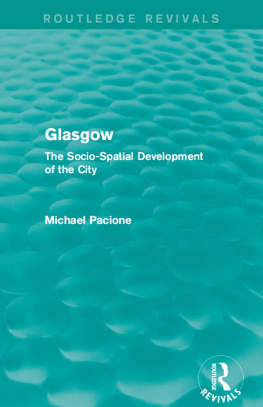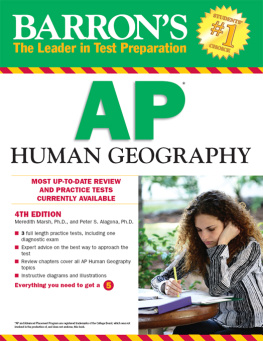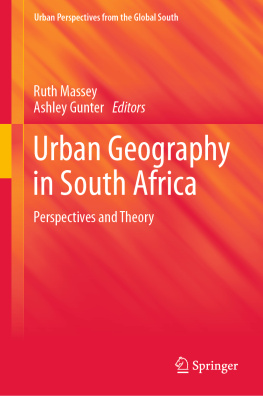Routledge Revivals
Progress in Urban Geography
A substantial proportion of the worlds population now live in towns and cities, so it is not surprising that urban geography has emerged as a major focus for research. This edited collection, first published in 1983, is concerned with the effects on the city of a wide range of economic, social and political processes, including pollution, housing, health and finance. With a detailed introduction to the themes and developments under discussion written by Michael Pacione, this comprehensive work provides an essential overview for scholars and students of urban geography and planning.
Progress in Urban Geography
Edited by
Michael Pacione
First published in 1983
by Croom Helm Ltd
This edition first published in 2013
by Routledge
2 Park Square, Milton Park, Abingdon, Oxon, OX14 4RN
Simultaneously published in the USA and Canada
by Routledge
711 Third Avenue, New York, NY 10017
Routledge is an imprint of the Taylor & Francis Group, an informa business
1983 Michael Pacione
All rights reserved. No part of this book may be reprinted or reproduced or utilised in any form or by any electronic, mechanical, or other means, now known or hereafter invented, including photocopying and recording, or in any information storage or retrieval system, without permission in writing from the publishers.
Publisher's Note
The publisher has gone to great lengths to ensure the quality of this reprint but points out that some imperfections in the original copies may be apparent.
Disclaimer
The publisher has made every effort to trace copyright holders and welcomes correspondence from those they have been unable to contact.
A Library of Congress record exists under LC control number: 82022757
ISBN 13: 978-0-415-70570-7 (hbk)
ISBN 13: 978-1-315-88955-9 (ebk)
PROGRESS IN URBAN GEOGRAPHY
Edited by Michael Pacione
CROOM HELM
London & Canberra
BARNES & NOBLE BOOKS
Totowa, New Jersey
1983 Michael Pacione
Croom Helm Ltd, Provident House, Burrell Row, Beckenham, Kent BR3 1AT
British Library Cataloguing in Publication Data
Pacione, Michael
Progress in urban geography.
1. Cities and towns
I. Title
910'.091732 GF125
ISBN 0-7099-2027-X
First published in the USA 1983 by
Barnes & Noble Books
81 Adams Drive
Totowa, New Jersey, 07512
ISBN 0-389-20357-2
Typeset by Leaper & Gard Ltd, Bristol
Printed and bound in Great Britain
by Billing and Sons Ltd Worcester
Contents
| Notes on Contributors |
| Index |
TO EMMA VICTORIA
Over the last twenty-five years urban geography has emerged as a major focus for research and teaching in human geography. This is due partly to the fact that a substantial and increasing proportion of the world's population now lives in towns and cities; partly to the recent and growing interest in the problem-solving or applied approach to geography; and partly to the eclectic nature of a sub-discipline with strong linkages to related fields in sociology, economics, psychology, politics and planning. Urban geography is concerned with the operation and effects on the city of a wide range of economic, social and political processes, each of which has generated a field of systematic investigation in its own right. It can be argued that the roots of the subject are to be found more in regional studies than in any systematic tradition.
Contemporary urban geography thus involves both studies of cities as regions and studies of specific themes within the urban setting, such as retailing, transport, housing or health. But urban based investigations are not merely micro-scale applications of some wider perspective the urban scale of reference brings with it new conceptual and methodological questions and presents unique problems for investigation.
The breadth of the subject and the scale and pace of change make it difficult for scholars to maintain contact with recent developments, keynote statements and relevant articles spread across a wide range of professional journals and less accessible reports. This volume is a direct response to the need for a text which reviews the progress and current state of the subject and which provides a reference point for future developments in urban studies. This collection of original essays is designed to encapsulate the major themes and recent developments in a number of areas of central importance in urban geography.
Michael Pacione
University of Strathclyde
Glasgow
Housing occupies a major part of any urban area. In David Kirby traces the development of geographical interest in housing research, and identifies demand-based and supply-based explanations. The former, focusing on the competition between households for urban land, incorporates three distinct lines of enquiry the neo classical economic approach; the essentially descriptive ecological approach; and the behavioural approach which is seen as a direct response to the failure of the more traditional perspectives to explain the spatial patterns identified. All three paradigms, however, fail to give explicit consideration to the constraints placed on demand; particularly important are those imposed by agencies responsible for the supply and allocation of housing. This supply-based perspective is developed in a discussion of the managerialist approach in which particular attention is given to the gatekeeper role of estate agents, private and public landlords, developers and builders, financial institutions, and government. Despite the range of research over the past decade the causal relationships and the processes operating within the housing system are imperfectly understood. Themes which require further empirical investigation include detailed studies of individual areas to determine the relative influence of the various factors within the housing system; the relationship between household choice and the constraints imposed by supply agencies; the identification of sub markets, including minority group needs; spatial variations in house prices; and the effect of public policy on the housing system.
The economic and social problems of large cities and of the inner city in particular have generated considerable debate. In Paul Bull identifies the absolute and relative shifts in the distribution of employment away from the major cities which have characterised many western countries over the last two decades, and describes the changing pattern of unemployment at the inter- and intra-city scales. The phenomenon of decentralisation resulting from either plant transfer or differential rates of growth or closure between central and peripheral locations is then considered in detail. The relative importance of the mechanisms underlying the process is assessed and a number of possible explanations of these spatial trends in manufacturing activity examined. Given the powerful forces in the economy for manufacturers to substitute capital for labour and to locate away from the inner areas of cities it is difficult to be optimistic about the short to medium term future of inner urban areas. The recent inner city partnerships between central government and local authorities, and the creation of enterprise zones are considered likely to be little more than palliatives. It is concluded that as the chances of creating many new jobs in manufacturing in any Western country are extremely small, the possibility of a major reduction in the current high levels of unemployment in the major cities appears to be slight.






